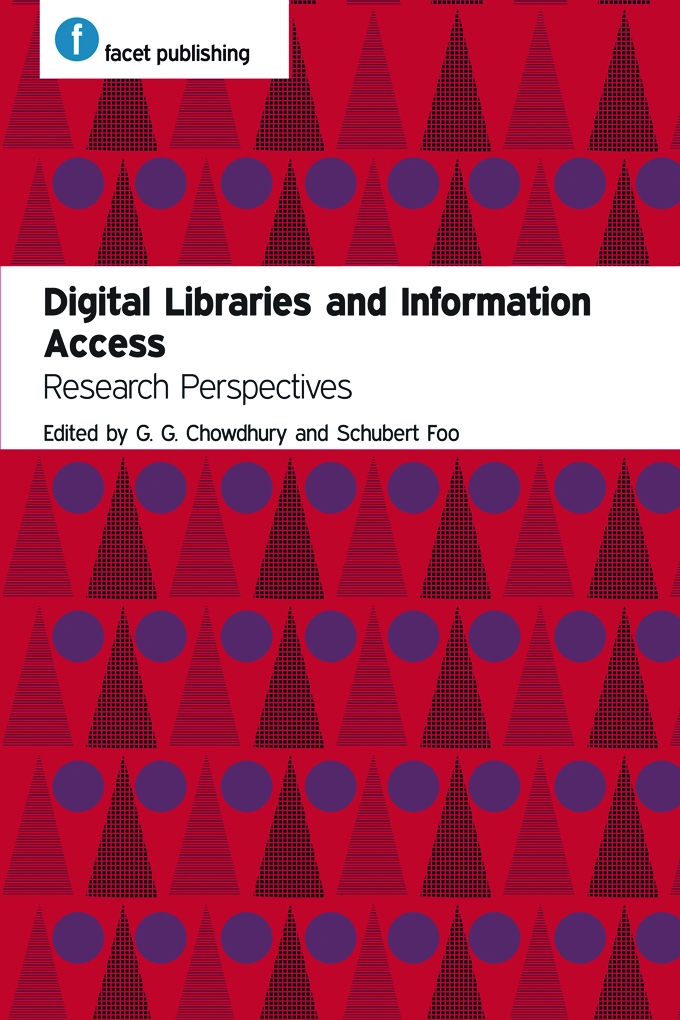Book contents
- Frontmatter
- Contents
- Foreword
- Editors and contributors
- 1 Digital libraries and information access: introduction
- 2 The design and architecture of digital libraries
- 3 Metadata and crowdsourced data for access and interaction in digital library user interfaces
- 4 Information access
- 5 Collaborative search and retrieval in digital libraries
- 6 The social element of digital libraries
- 7 Towards socially inclusive digital libraries
- 8 Users’ interactions with digital libraries
- 9 Digital libraries and scholarly information: technology, market, users and usage
- 10 Digital libraries and open access
- 11 iSTEM: integrating subject categories from multiple repositories
- 12 The usability of digital libraries
- 13 Intellectual property and digital libraries
- 14 Digital preservation: interoperability ad modum
- 15 Digital libraries and information access: research trends
- Index
- Miscellaneous Endmatter
5 - Collaborative search and retrieval in digital libraries
Published online by Cambridge University Press: 08 June 2018
- Frontmatter
- Contents
- Foreword
- Editors and contributors
- 1 Digital libraries and information access: introduction
- 2 The design and architecture of digital libraries
- 3 Metadata and crowdsourced data for access and interaction in digital library user interfaces
- 4 Information access
- 5 Collaborative search and retrieval in digital libraries
- 6 The social element of digital libraries
- 7 Towards socially inclusive digital libraries
- 8 Users’ interactions with digital libraries
- 9 Digital libraries and scholarly information: technology, market, users and usage
- 10 Digital libraries and open access
- 11 iSTEM: integrating subject categories from multiple repositories
- 12 The usability of digital libraries
- 13 Intellectual property and digital libraries
- 14 Digital preservation: interoperability ad modum
- 15 Digital libraries and information access: research trends
- Index
- Miscellaneous Endmatter
Summary
Introduction
Information retrieval may be considered as the quest for content relevant to a given information need. This is typically expressed by query terms submitted to a search engine. However, the performance of existing search engines has been shown to be far from users’ satisfaction in their precision and recall. For example, a search engine often returns thousands of results in response to a query, but the results contain information irrelevant to the user's information needs. This phenomenon can be attributed to a few causes. First, errors may be introduced during query formulation. Such errors may include lexical/spelling errors and syntactic errors in which the query is expressed in a form not compatible with the query language (Willson and Given, 2010). This could be because users are unfamiliar with the syntax and semantics associated with the particular search interface (Belkin, 2000). Second, users may not be able to adequately express their information needs as query terms. Here, there may be a disparity between users’ query terms that express their information needs and those used in the system to describe the information sources (Furnas et al., 1987). Additionally, users could fail to choose terms at a proper conceptual level to specify their information needs.
Ensuring that information needs are met efficiently and effectively is critical, given the increasing popularity of social computing applications, which has empowered users to create and share content on the web. Such user-generated content may include text (e.g. blogs, wikis), multimedia (e.g. YouTube) and even organizational/navigational structures providing personalized access to web content (e.g. social tags). The result is that people have now come to depend more on the web in searching for information. However, the amount of information and its growth is a double-edged sword, due to the problem of information overload, leading to a situation where users are swamped with too much information, resulting in the difficulty of sifting through the materials in search of relevant content.
Some may argue that the above problems may be less complex in digital libraries, especially when a collection is more focused and, typically, there are stakeholders who ensure the quality and the relevancy of the collection.
- Type
- Chapter
- Information
- Digital Libraries and Information AccessResearch perspectives, pp. 69 - 82Publisher: FacetPrint publication year: 2012



